Classification of Saint-Émilion wine
In 1955, the wines of Saint-Émilion in the wine-growing region of Bordeaux were classified. Unlike the Bordeaux Wine Official Classification of 1855 covering wines from the Médoc and Graves regions, the Saint-Émilion list is updated every 10 years or so. Following the initial classification, the list was updated in 1969, 1986, 1996, 2006, and 2012. However the 2006 classification was declared invalid following a series of legal actions, and the 1996 version of the classification has been reinstated for the vintages from 2006 to 2009.
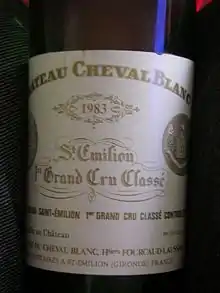
The region's Syndicat Viticole started planning for a classification of St.-Émilion wine in 1930, but it was not until October 7, 1954 that the principles behind the classification became official when the INAO agreed to take responsibility for handling the classification. The first list of classified St.-Émilion estates was published on June 16, 1955, and was amended on August 7 and October 18, 1958. The original list contained 12 Premier grands crus classés and 63 Grands crus classés.
Controversy surrounding the 2006 classification
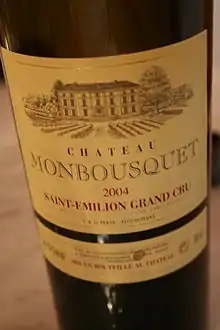
The fifth classification of St.-Émilion wine, announced in September 2006 and comprising 15 Premiers grands crus classés and 46 Grands crus classés,[1] was challenged by four dissatisfied producers that had been demoted - La Tour du Pin Figeac, Cadet Bon, Guadet and Château de la Marzelle - and has resulted in several confusing legal turns during 2007 and 2008 that currently mean that the 2006 classification is invalid and the 1996 classification is applied instead. The legal dispute has centered on the fact that several members of the panel involved in assessing the wines had vested interests (e.g. as négociants with business dealings with some of the châteaux), and thus could be suspected of not being impartial.
Initially, an administrative tribunal in Bordeaux declared the classification temporarily suspended in March 2007,[2] after which a Bordeaux court suspended the classification indefinitely by denying a motion to lift the initial suspension.[3] After that the Conseil d'État, the French supreme administrative court, on November 12, 2007 overturned the suspension of the 2006 classification, thereby reinstating it.[4] However, this ruling was not final, and only decided that the case of the four demoted châteaux did not merit a suspension of the entire classification. The matter was returned to a Bordeaux court to assess if the complaining châteux had been fairly treated. On July 1, 2008 this court ruled that the wine tasting mechanism used in the 2006 classification was not impartial, thus again making the entire classification invalid.[5]
Immediately after the ruling, it was estimated that a further appeals process aiming at reinstating the classification could take about two years, and would have an uncertain result. This led the French regulatory body for wine, INAO, to request the French Government to use emergency powers to reinstate St.-Émilion classification, which it did on July 11, 2008.[6] This decision extended the validity of the 1996 classification to the vintages 2006 to 2009. Thus, the complaining demoted châteaux are able to keep their classification, but those who were newly promoted are not. Presumably, this measure will allow INAO to arrange for a less contested classification to be finalised by around 2010.
The reaction among the estates who had their promotions retracted, such as Grand Corbin-Despagne, Monbousquet, Pavie-Macquin and Troplong Mondot, was one of despair, who beyond facing financial consequences stated the decision was unjust, and damaging to the image and community of St.-Émilion.[7][8] Xavier Pariente of Troplong-Mondot said, "That's almost 20 years of hard work and investment by all the personnel here wiped out at the stroke of a pen. It frightens me and it revolts me".[9]
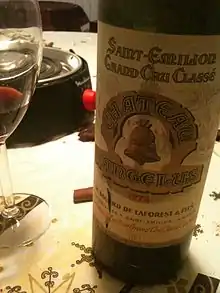
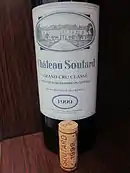

In December 2008, the French senate had allowed the 8 demoted estates to regain their previous status, with Pavie-Macquin and Troplong Mondot returning to Premiers grands crus classés, while Bellefond-Belcier, Destieux, Fleur-Cardinale, Grand Corbin, Grand Corbin-Despagne, and Monbousquet again to become classified as Grands crus classés, as a result of several months of lobbying.[10] However, in January 2009 this proposal was thrown out by the French government constitutional council.[11]
In March 2009, it was stated that the French Court of Appeal had made a final ruling, that the 2006 Saint-Émilion classification will not stand,[12] although the ultimate outcome was the opposite. A law passed on May 13, 2009 contained a footnote clarifying that the six chateaux promoted to Grand Cru Classe in 2006 would be able to keep their status with immediate effect, and date it back to the date of the classification, therefore the status of the classified estates of 1996, plus the eight chateaux promoted in 2006, is mandated by law until 2011, two years beyond what was previously scheduled.[13][14]
The 2012 classification
The 2012 classification was conducted differently than previous efforts, with tastings and inspections outsourced by INAO to independent groups with no involvement by St.-Emilion Wine Syndicate and Bordeaux wine trade, but instead wine professionals from Burgundy, the Rhône Valley, Champagne, the Loire Valley and Provence made up a seven-person commission. There is no longer a fixed number of châteaus which can be classified, and the new rankings elevated Château Pavie and Château Angélus to Premier Classe A. Among new Premiers grands crus were Larcis Ducasse, Canon-la-Gaffelière and garagiste producers Valandraud and La Mondotte, while Château Magdelaine was omitted from the list as it will be merged with Château Bélair-Monange.[15][16][17] Château La Tour du Pin Figeac (Moueix) did not apply for the 2012 classification, as it was being merged with Chateau Cheval Blanc.
In January 2013, Château La Tour du Pin Figeac (Giraud-Bélivier), Chateau Croque-Michotte and Château Corbin-Michotte filed complaints with a Bordeaux administrative tribunal, claiming there were procedural errors in the selection process. Chateau La Tour du Pin Figeac, had previously challenged its demotion in the disputed 2006 classification without being reinstated in 2012, while Château Croque-Michotte was refused promotion from Grand cru to Grand cru classé and Château Corbin-Michotte had been demoted from Grand cru classé.[18]
Classification
The classification comprises 18 Premiers grands crus classés and 64 Grands crus classés.
| Premier Grand Cru Classé 'A' | ||
|---|---|---|
| Château Angélus[d] | Château Ausone | Château Cheval Blanc |
| Château Pavie[d] | ||
| Premier Grand Cru Classé 'B' | ||
| Château Beauséjour (Duffau-Lagarrosse) | Château Beau-Séjour Bécot | Château Bélair-Monange |
| Château Canon | Château Canon-la-Gaffelière[d] | Château Figeac |
| Clos Fourtet | Château La Gaffelière | Château Larcis Ducasse[d] |
| La Mondotte[d] | Château Pavie-Macquin[a][d] | Château Troplong Mondot[a] |
| Château Trotte Vieille | Château Valandraud[d] | |
| Grand Cru Classé | ||
| Château l'Arrosée | Château Balestard la Tonnelle | Château Barde-Haut[d] |
| Château Bellefont-Belcier[c][d] | Château Bellevue[b] | Château Berliquet |
| Château Cadet Bon[b] | Château Cap de Mourlin | Château Chauvin |
| Château Clos de Sarpe[d] | Château la Clotte | Château la Commanderie[d] |
| Château Corbin | Château Côte de Baleau[d] | Château la Couspaude |
| Château Dassault | Château Destieux[c][d] | Château la Dominique |
| Château Faugères[d] | Château Faurie de Souchard[b] | Château de Ferrand[d] |
| Château Fleur-Cardinale[c][d] | Château La Fleur Morange[d] | Château Fombrauge[d] |
| Château Fonplégade | Château Fonroque | Château Franc Mayne |
| Château Grand Corbin[c][d] | Château Grand Corbin-Despagne[c][d] | Château Grand Mayne |
| Château les Grandes Murailles | Château Grand Pontet | Château Guadet[d] |
| Château Haut Sarpe | Clos des Jacobins | Couvent des Jacobins |
| Château Jean Faure[d] | Château Laniote | Château Larmande |
| Château Laroque | Château Laroze | Château la Madelaine[d] |
| Château La Marzelle[b] | Château Monbousquet[c][d] | Château Moulin du Cadet |
| Clos de l'Oratoire | Château Pavie-Decesse | Château Peby Faugères |
| Château Petit Faurie de Soutard[b] | Château de Pressac[d] | Château Le Prieuré |
| Château Quinault l'Enclos[d] | Château Ripeau | Château Rochebelle[d] |
| Château Saint Georges (Côte Pavie) | Clos Saint-Martin | Château Sansonnet[d] |
| Château La Serre | Château Soutard | Château Tertre Daugay[b] |
| Château La Tour Figeac | Château Villemaurine[b] | Château Yon Figeac[b] |
| Former Cru Classé | ||
| Château Corbin Michotte[e] | Château La Tour du Pin Figeac (Giraud-Bélivier)[b][e] | |
| Château La Tour du Pin Figeac (Moueix)[b][f] | ||
Other categories
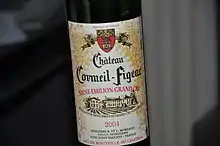
Over two hundred other Saint-Émilion wines carry the description "Grand Cru", however this designation is awarded under the basic appellation rules and is not part of the formal 1955 classification.[19] Wines in this category are not seen as being of comparable quality to the Grand Cru Classés.[20][21]
See also
- Saint-Émilion AOC
- Regional wine classification
- Bordeaux wine regions
- History of Bordeaux wine
Notes and references
a. ^ Promoted to Premier grand cru classé in 2006 and relegated in 2008[6]
b. ^ Declassified in 2006 and reinstated in 2008[6]
c. ^ Classified in 2006 and declassified in 2008[6]
d. ^ Promoted in 2012[15]
e. ^ Demoted in 2012[15]
f. ^ Did not reapply for classification, ceased to exist and absorbed into Château Cheval Blanc in 2012[22]
- Château la Clusière is no longer listed as it is now part of Château Pavie and Château Curé-Bon-la-Madeleine is no longer listed as it is now part of Château Canon.[1]
- Chateau Guadet changed its name from Chateau Guadet-St Julien in 2005[15]
- Château Cadet Piola is no longer listed as it is now part of Château Soutard, Château Bergat part of Trottevielle, Château Haut-Corbin part of Grand Corbin and Château Matras now partly in Canon.[15]
- Château Magdelaine merged with Château Bélair-Monange.[15][17]
- General
- "Saint-Émilion 2012 classification list" (PDF). Archived from the original (PDF) on 2012-11-14. Retrieved 2012-09-13. vins-saint-emilion.com
- Footnotes
- Brook, Stephen, Decanter.com (2006-09-08). "New St Emilion classification: surprises but no shocks".
- Styles, Oliver & Anson, Jane, Decanter.com (2007-03-30). "St-Emilion classification suspended". Archived from the original on 2008-06-11. Retrieved 2008-07-02.CS1 maint: multiple names: authors list (link)
- Kevany, Sophie , Decanter.com (2007-04-14). "St Emilion classification suspended indefinitely". Archived from the original on 2008-06-11. Retrieved 2008-07-02.
- Kakaviatos, Panos, Decanter.com (2007-11-14). "St Emilion back on track after classification ban lifted". Archived from the original on 2008-01-13. Retrieved 2008-01-28.
- Kevany, Sophie , Decanter.com (2008-07-02). "St Emilion classification finally ruled invalid". Archived from the original on 2008-07-04. Retrieved 2008-07-02.
- Kevany, Sophie , Decanter.com (2008-07-11). "St Emilion classification reinstated - again". Archived from the original on 2008-07-15. Retrieved 2008-07-13.
- Erlanger, Steven, The New York Times (July 24, 2008). "Ruling Turns a Village of Winemakers on Itself".
- Macle, Diana, Wine Spectator (July 29, 2008). "French Government Reinstates St.-Emilion Classification—Sort Of". Archived from the original on May 2, 2009. Retrieved August 5, 2008.
- Sage, Adam, The Times (September 9, 2008). "Class war strikes Saint-Émilion châteaux as vineyards lose their titles". London.
- Styles, Oliver , Decanter.com (December 22, 2008). "Demoted St-Emilion chateaux return to 2006 classification". Archived from the original on April 17, 2009. Retrieved January 3, 2009.
- Styles, Oliver, Decanter.com (January 7, 2009). "French government dismisses St-Emilion reclassification proposal".
- Gibb, Rebecca, Decanter.com (March 17, 2009). "Saint-Emilion classification ditched". Archived from the original on April 23, 2009. Retrieved March 18, 2009.
- Anson, Jane, Decanter.com (May 18, 2009). "'Nightmare' of St Emilion classification finally over". Archived from the original on May 22, 2009. Retrieved May 18, 2009.
- Macle, Diana, Wine Spectator (May 20, 2009). "French Government Reinstates St.-Emilion Promotions". Archived from the original on July 26, 2009. Retrieved May 21, 2009.
- Anson, Jane; Lechmere, Adam, Decanter.com (September 7, 2012). "'Only three chateau dropped in new St Emilion classification".
- Mustacich, Suzanne, Wine Spectator (September 7, 2012). "'St.-Emilion Issues a Surprising New Classification".
- Molesworth, James, Wine Spectator (September 12, 2012). "Moueix Merges Two St.-Emilion Wineries".
- Mercer, Chris, Decanter.com (January 15, 2013). St Emilion chateaux begin legal action against Classification
- Kissack, Chris. "St Emilion Classification". Archived from the original on 2009-02-01. Retrieved 2009-01-13.
- Coates, Clive. The Wines of Bordeaux. University of California Press. pp. 294. ISBN 0-520-23573-8.
- Joseph, Robert. French Wines. Dorling Kindersley. p. 89. ISBN 0-7513-0793-9.
- The Winecellar Insider. "Chateau La Tour du Pin St. Emilion Bordeaux Wine, Complete Guide". Retrieved 2019-09-20.
